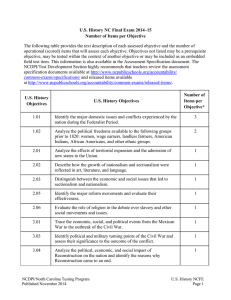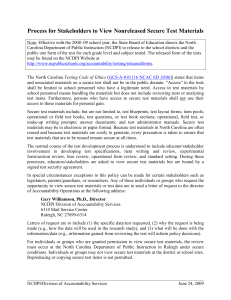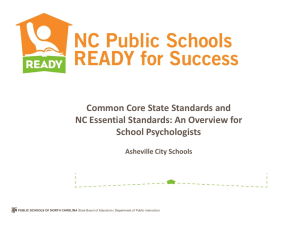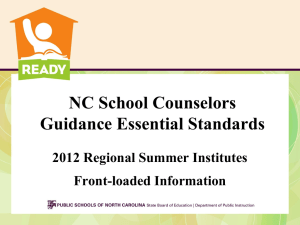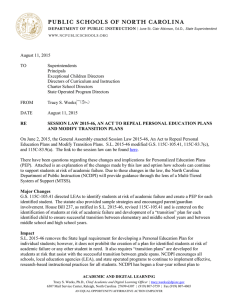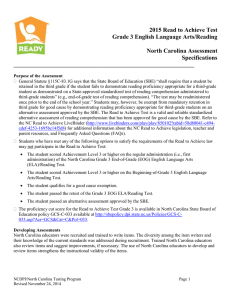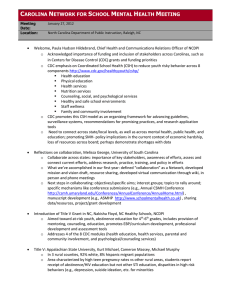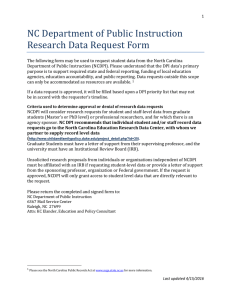Character Education Initiative Grant 2011 Guidelines and Application
advertisement
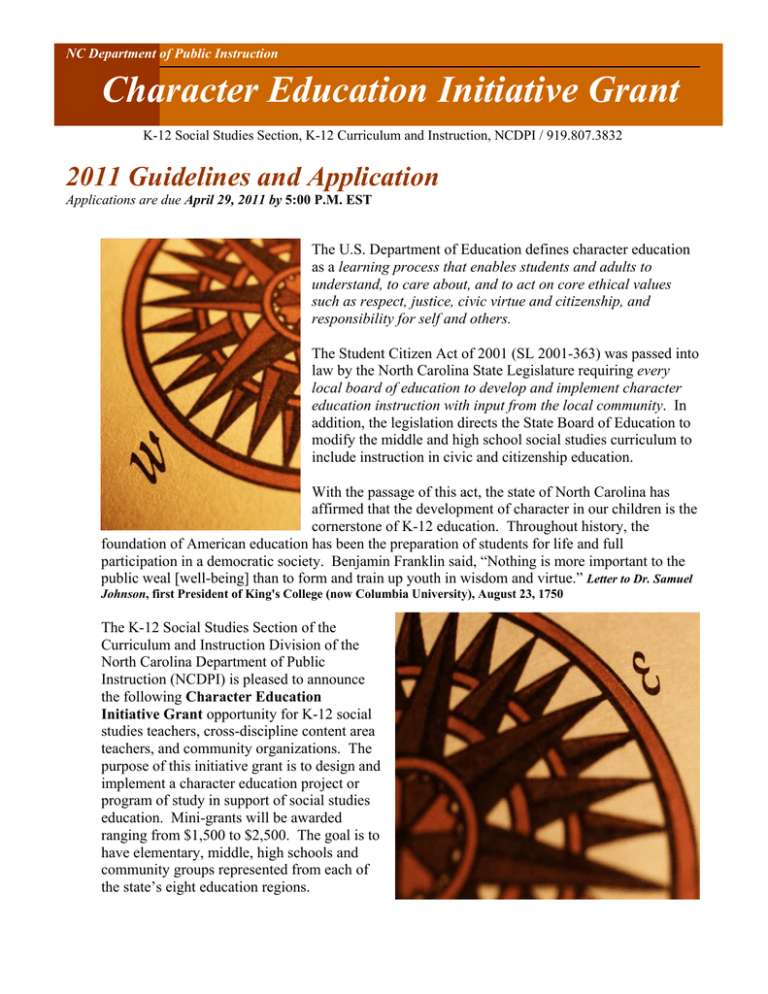
NC Department of Public Instruction Character Education Initiative Grant K-12 Social Studies Section, K-12 Curriculum and Instruction, NCDPI / 919.807.3832 2011 Guidelines and Application Applications are due April 29, 2011 by 5:00 P.M. EST The U.S. Department of Education defines character education as a learning process that enables students and adults to understand, to care about, and to act on core ethical values such as respect, justice, civic virtue and citizenship, and responsibility for self and others. The Student Citizen Act of 2001 (SL 2001-363) was passed into law by the North Carolina State Legislature requiring every local board of education to develop and implement character education instruction with input from the local community. In addition, the legislation directs the State Board of Education to modify the middle and high school social studies curriculum to include instruction in civic and citizenship education. With the passage of this act, the state of North Carolina has affirmed that the development of character in our children is the cornerstone of K-12 education. Throughout history, the foundation of American education has been the preparation of students for life and full participation in a democratic society. Benjamin Franklin said, “Nothing is more important to the public weal [well-being] than to form and train up youth in wisdom and virtue.” Letter to Dr. Samuel Johnson, first President of King's College (now Columbia University), August 23, 1750 The K-12 Social Studies Section of the Curriculum and Instruction Division of the North Carolina Department of Public Instruction (NCDPI) is pleased to announce the following Character Education Initiative Grant opportunity for K-12 social studies teachers, cross-discipline content area teachers, and community organizations. The purpose of this initiative grant is to design and implement a character education project or program of study in support of social studies education. Mini-grants will be awarded ranging from $1,500 to $2,500. The goal is to have elementary, middle, high schools and community groups represented from each of the state’s eight education regions. Application Evaluation Applications for grant funding of the proposed project will be evaluated on the following criteria and according to the rubric provided within this application package: • Compatibility with the Character Education Partnership’s (CEP) Eleven Principles of Effective Character Education: The proposed project should reflect the following principles of effective character education. The project should: 1.…promote core ethical and performance values as the basis of good character. 2.…define “character” comprehensively to include thinking, feeling and doing. 3.…use a comprehensive, intentional and proactive approach to character development. 4.…support a caring school community. 5.…provide students with opportunities for moral action. 6.…support a meaningful and challenging academic curriculum that respects all learners, develops their character, and helps them to succeed. 7.…help foster students’ self-motivation. 8.…demonstrate that the school staff is an ethical learning community that shares responsibility for character education and adheres to the same core values that guide the education of students. 9.…demonstrate that the school fosters shared moral leadership and long-range support of the character education initiative. 10…engage families and community members as partners in the characterbuilding effort. 11…evaluate the culture and climate of the school, the functioning of the staff as character educators and the extent to which students manifest good character. For a greater understanding of these eleven principles access the CEP website at http://www.character.org/elevenprinciples • Standard Course of Study: The proposed project effectively integrates character education within the North Carolina Standard Course of Study for Social Studies at a particular grade level or course. In addition, the proposed project can effectively integrate character education and the standard course of study for Social Studies with the NCSCOS of other disciplines. • Experiential Learning (e.g., service learning, cooperative learning, peer mentoring and problem-based learning): The proposed project utilizes community-based, real-world experiences that illustrate a majority of the eleven character principles mentioned above and effectively increases student engagement within the classroom and the community. • Diversity and Differentiation: The proposed project is designed to reach youth of differing achievement levels, socio-income-levels, and ethnic backgrounds. 2011-12 NCDPI Character Education Initiative Grant 2 Grant Application Requirements • The Character Education Initiative Grant is open to K-12 social studies teachers, crossdiscipline content area teachers and community organizations. • Applicants must use the grant in support of the NC Standard Course of Study for Social Studies. • Applicants must be willing to commit to and abide by all of the guidelines of this grant. Grant Award Process Grant applications will be reviewed and evaluated by a committee, which will recommend the funding of grants from each educational region. The goal of the committee is to award grants to North Carolina teachers and community organizations in support of character and social studies education (K-5, 6-8, 9-12). Grant applications must be submitted electronically by 5:00 P.M. EST on April 29, 2011. (Late proposals will not be accepted.) Submit applications electronically to Dalton Edwards at DEEdward@dpi.state.nc.us . • Grant selection: May 2-6, 2011 • State Board of Education notification: May 2011 • Grant announcement and award: June 2011 • Grant implementation: June–December, 2011 • Evaluations: Due by February 3, 2012 Grant Award • The Grant funds will be forwarded to your LEA finance officer immediately following approval by the State Board of Education in June 2011. • Recipients will be responsible for working with the LEA and school finance officer to establish a system to use funds as requested and to maintain an accurate record keeping system. 2011-12 NCDPI Character Education Initiative Grant 3 Steps in the Application Process 1. Planning Classroom teachers must plan and be ready to initiate the project either during the summer of 2011 or the beginning of the fall semester of the 2011-2012 academic school year. 2. Organizing Project information should be organized using the “Application Format Outline” provided on the next page. Please answer each question using complete sentences. 3. Problem-Solving As you design your project and prepare the application, questions may arise. Applicants are encouraged to contact Dal Edwards at 919.807.3832 or email at DEEdward@dpi.state.nc.us. 4. Proof Writing Please proof all written work before electronic submission. 5. Cover Page After the completion of the final version of the grant application, carefully fill out the “Grant Application Cover Sheet,” including an electronic signature and date. 6. Official Endorsement A senior official (principal, superintendent, or central office curriculum/social studies supervisor) must submit a letter endorsing your project using official school or central office letterhead. 7. Appendix If there is information relevant to your project that is not explicitly called for in the application, such information may be included as an appendix; however, please keep this supplementary material to a minimum. NCDPI is most interested in your original ideas. Photocopies from teacher manuals, web sites or other resource materials will not be accepted. 8. Electronic Submission Please send the completed application to Dal Edwards at DEEdward@dpi.state.nc.us no later than April 29, 2011 by 5:00 P.M. EST. 2011-12 NCDPI Character Education Initiative Grant 4 Application Format Outline Eight sections are required for a completed application. Please arrange your proposal according to the format described below. No handwritten applications or applications by postal mail will be accepted. Section 1 Grant Application Cover Sheet: A blank copy of the Cover Sheet is inserted in this application. Please provide all information called for on the Cover Sheet. Section 2 Endorsement: The project described in the grant application must be acknowledged and endorsed by either your principal, superintendent, central office curriculum/ social studies supervisor, or Character Education support person in a formal letter. Any letter of endorsement must be on official school or central office letterhead and must be signed by the appropriate endorsee. A scanned copy may be sent as part or your application. Section 3 Title/Objectives/Planned Outcomes: Improving student character within the framework of the North Carolina Social Studies Standard Course of Study is the primary purpose of this grant. State the title of the project and exactly what student learning objectives you will reach by implementing this project. Goals/Objectives should be realistic, directly related to the social studies standard course of study and character education, measurable, and attainable within the time period for implementation. Section 4 Methods: Exactly what do you want to do in your classroom that will result in the accomplishment of the goals/objectives cited in Section 3? Describe your choice of methods, materials, and strategies for producing your desired student outcomes. Section 5 Project Management: List and describe activities that will be managed by you and others to complete this project. If other teachers, personnel or members of the community are involved, describe their involvement. Indicate who will oversee the purchase of materials. Section 6 Project Timetable: Create a concise timetable (chart or list of activities and deadlines) that shows all the key project activities and estimate the amount of time for each activity. Section 7 Budget: Provide a cost estimate for each item you are seeking to fund. Describe all items in the budget and explain how they will be used to support character education and the goals/objectives stated in Section 3. In pricing, ask for teacher discounts where applicable. Budget restrictions include salaries, honorariums, gratuities, food and beverages, travel, computers, and other technological hardware. Section 8 Evaluation: Upon completion of the project, you must prepare a final report in which you provide evidence – qualitative and quantitative – that you fulfilled what you stated you would do in the grant application and that your goals/objectives were met. Measurements of student learning throughout the project (e.g., journals, photos, portfolios, pre- and post-student evaluations) may be included in the evaluation of your grant. The evaluation due date is February 3, 2012. (All reports will be submitted to the State Board of Education to demonstrate proper use of grant funds.) 2011-12 NCDPI Character Education Initiative Grant 5 Grant Application Cover Sheet Title of Proposal: Submitted by: Name of Teacher/Name of Community Organization & Director Education Region (1-8) School District School/Community Organization Address School City School Level (Elem., Middle, High) State Zip School/Community Organization Email Address School/ Community Organization Phone Number (With Area Code) Alternate/Cell Phone Number School Administrator (Name/Title) Work Email Address Work Phone Number School Finance Officer (Name/Title) Work Email Address Work Phone Number LEA/District Finance Officer (Name/Title) Work Email Address Work Phone Number Amount Requested Number of Students to Benefit Project Beginning & Ending Dates Narrative Statement Summarize your project proposal on a separate sheet of paper. Be sure to include a list of the most important learning objectives of the project. Be sure to include specific application criteria. Also include the names and specific roles of those people you may be partnering with to fulfill the objectives of the project. This list may include other teachers, members of the community, or professional organizations. The summary should be no more than one typed double spaced page. _________________________________________________________________________ Applicant’s Signature 2011-12 NCDPI Character Education Initiative Grant Date 6

